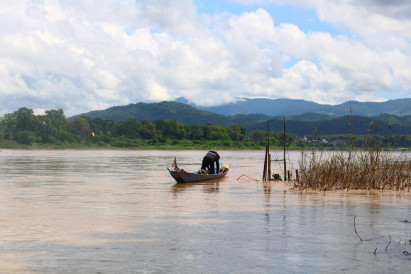Say flooding, river damage ‘very likely’

Locals in Chiang Rai’s Wiang Kaen district have raised concerns over possible floods on over 10,000 rai of low-lying communities and farmlands if the Pak Beng hydropower dam project in Laos is built.
The Pak Beng hydropower dam project is to be built on the Mekong River in Oudomxai Province of Laos. Montree Chantawong, lead environmental researcher and founder of The Mekong Butterfly, said the dam will harm the river and could cause extensive flooding across the border into Thailand’s territory.
The project is a joint venture by China Datang Overseas Investment Co Ltd and Gulf Energy Development Plc.
This US$2.3 billion (86 billion baht) dam will have an electricity generation capacity of 920 megawatts and is expected to start operating in 2033. About 90% of its power generation will be sold to Thailand.
Citing the project’s technical review report, Mr Montree said the backwater effects from the dam will intrude over 10 kilometres into Thailand’s part of the Mekong River, causing large areas of Chiang Rai’s Wiang Kaen district to be flooded. “The dam constructed over the main channel of Mekong River will also create drastic changes to the river’s hydrology, which will further damage the river’s fragile ecosystems,” he said. “However, there is no official study of the dam’s transboundary impacts.”
Apitan Thipta, mayor of Muang Yai subdistrict municipality, said locals in Wiang Kaen district are concerned about backwater effects from the dam, which may further intrude into the Ngao River, a tributary of the Mekong River, and affect fertile farmlands and pomelo orchards.
“Agricultural produce, especially pomelo, is the district’s primary source of income. It makes over 500 million baht from pomelo alone,” Mr Apitan said. “However, as over 10,000 rai of arable farmland is situated along the Mekong River and low-lying plains of the Ngao River Basin; these areas are at risk of being flooded.”
Chaiwat Doungthida, a local fisherman in Wiang Kaen district, said he was worried his livelihood would be destroyed if Pak Beng Dam is built. “Fishermen on the river have already suffered from the impacts of existing hydropower dams in China and Laos, as Mekong fish stocks have depleted and many fish species have gone extinct,” Mr Chaiwat said. “If another dam is built on the Mekong River, it will mean the end of my career.”
Gulf Energy Development Plc said Pak Beng Dam is a run-of-the-river hydropower dam project, which uses the natural flow of water to generate electricity, so it would have no impact on the environment.

